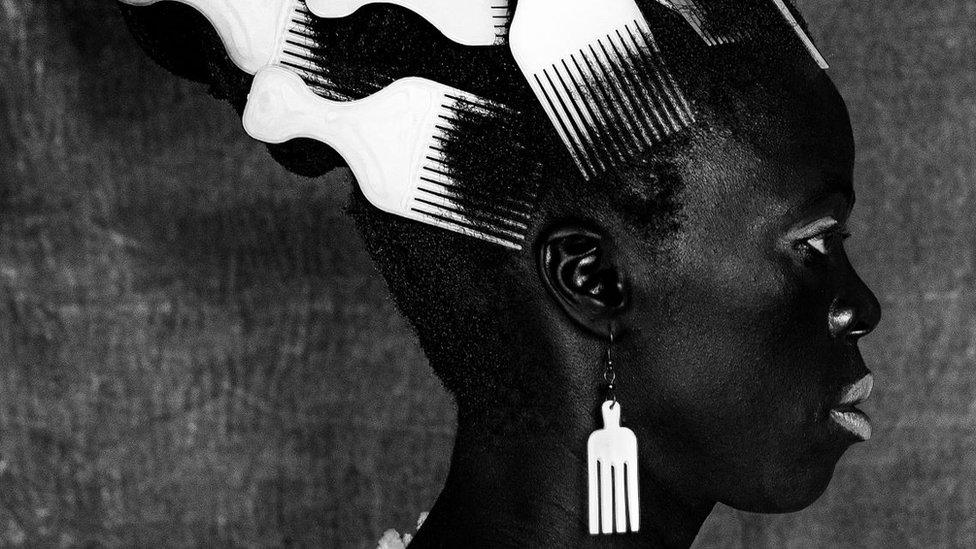The Nigerian artist who turned pain into fame during lockdown
- Published
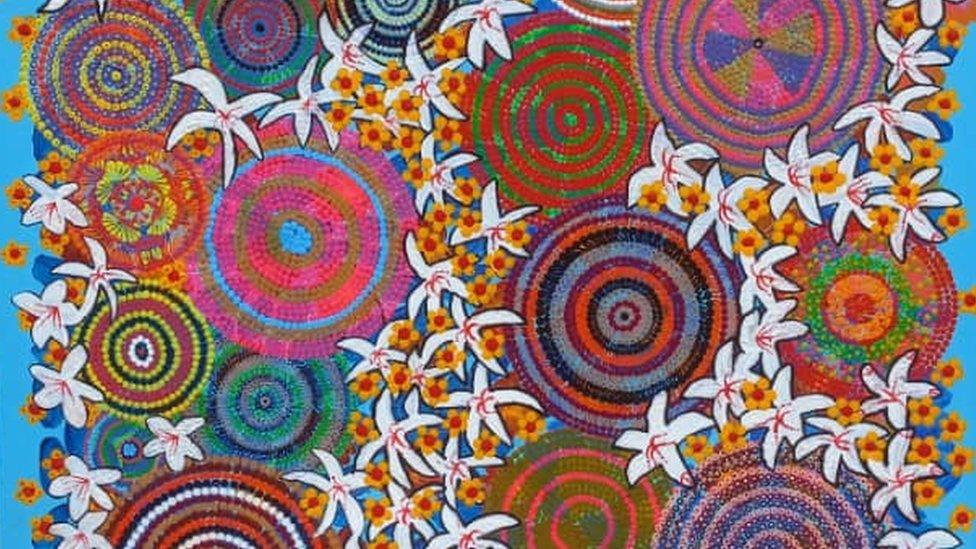
The beauty of paintings by Ijeoma Ogwuegbu disguises the pain she is living through.
Stacked up against a wall in the Nigerian artist's home studio in Lagos are canvasses adorned with swirls and circles of bright colour.
Some are abstract and some have more recognisable forms but are clearly impressionistic.
These are the works of an artist who took up painting 18 months ago as a way to deal with the searing discomfort caused by a condition known as fibromyalgia.
Two of the paintings are very familiar because they have been seen by thousands on social media.
One is a large piece, made using Dot Art technique, that drew the praise of actor Thandiwe Newton on Twitter, external, causing the work to go viral.
The other work depicts a triumphant female, her form and contours bursting with flowers, from the flaming sunflower hair to her feet.
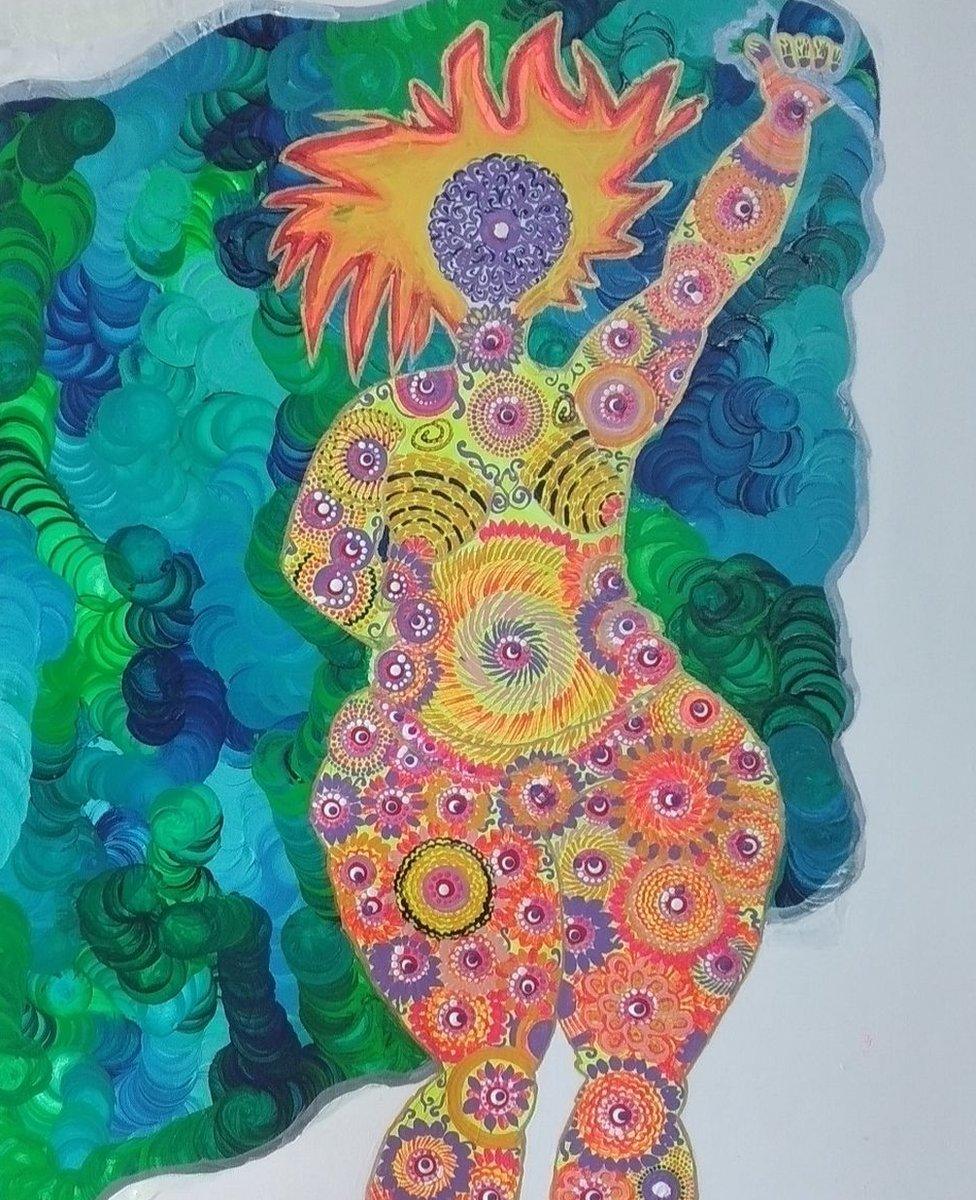
Ogwuegbu says this represents a woman who insists that the world accept her as she is

Titled Ada Umuawa-Alike, partly a reference to Ogwuegbu's hometown in Abia state, south-east Nigeria, the painting represents "this image of a woman who had decided that she was going to be fully herself," the artist explains.
"What was so strong in my heart is the idea that a woman's body is so much like target practice for the world. Every part of our body, you will find someone that has an opinion about it and they want to make you aware of their opinion about it.
"For me, [Ada Umuawa-Alike] felt like someone who decided who she was and told the world to deal with it because she was done hiding."
This is not unlike Ogwuegbu, herself, who fights a daily battle in her own body with fibromyalgia, which causes chronic pain all over the body.
She says of the painting: "To me, it's a self-portrait. I think about what part of my body is open for target practice and I also think about the parts of my body in pain and how it correlates."
Though working in creative fields for some 20 years, the mother of three had never given thought to visual art or paint and canvas for most of that time.
"I was not in any way, shape or form intensely interested in [visual] art.
"It's been such a learning curve. That's why it's been refreshing," she says.
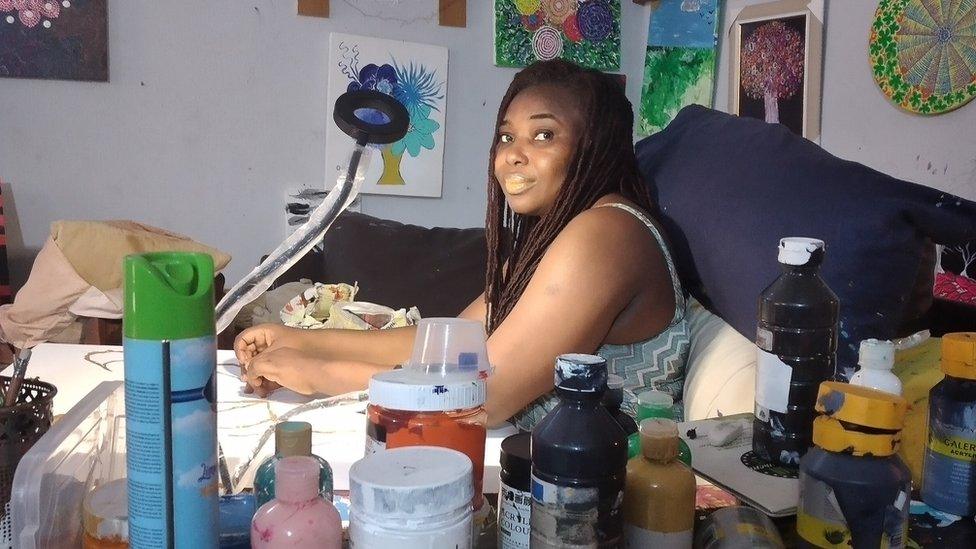
Ijeoma Ogwuegbu has found fans around the world
Her original creative outlet was writing, first as a poet and journalist, and later as a TV writer, through which she built a solid career in the Nigerian entertainment industry.
She was a scriptwriter and later script editor on one of Nigeria's most popular TV series, Tinsel, for almost eight years. Other credits include the TV series Battleground and Hotel Majestic, as well as several films.
It all came crashing down when she started suffering the symptoms of fibromyalgia in January 2019, compounded by the emotional upheaval of a failing marriage.
Then followed many months of confusion about what was happening to her body, until she finally got the diagnosis in November of that year.
Soon after, the Covid-19 pandemic lockdown came into the mix, cranking up the pressure.
The pain is constant.
"As I'm talking now, I have pain on so many levels, I can't even count," she says.
"I have pain in my skin. Then I have pain in the nerves under my skin. I also have pain in my muscles, my skeletal frame, my joints.
"It's like that, and each layer of pain should be enough to put me out for today, but at some point you just have to figure out how to live with it. It's why I started lying on the floor to paint."
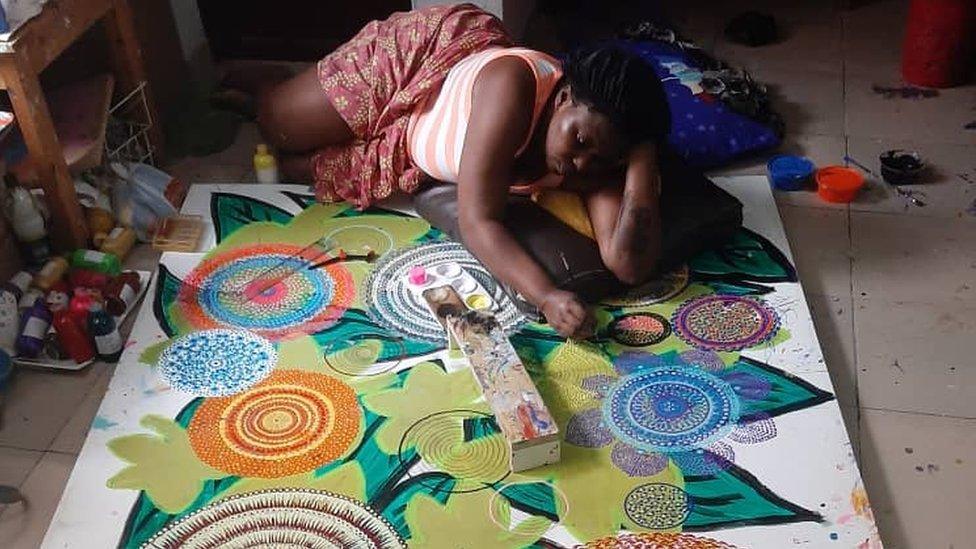
Ijeoma Ogwuegbu: The stigma around mental health is still very strong
The pain, coupled with the adverse cognitive effects of the condition resulting in a "fibro-fog," left Ogwuegbu no choice but to give up work.
"You have trouble remembering things," she says, describing what the fog means.
"In the last three years, there have been events that I have absolutely no recollection of.
"That's what happens to your brain. I was working as a script editor and the number one job of a script editor is that you know the story. I had to let the job go."
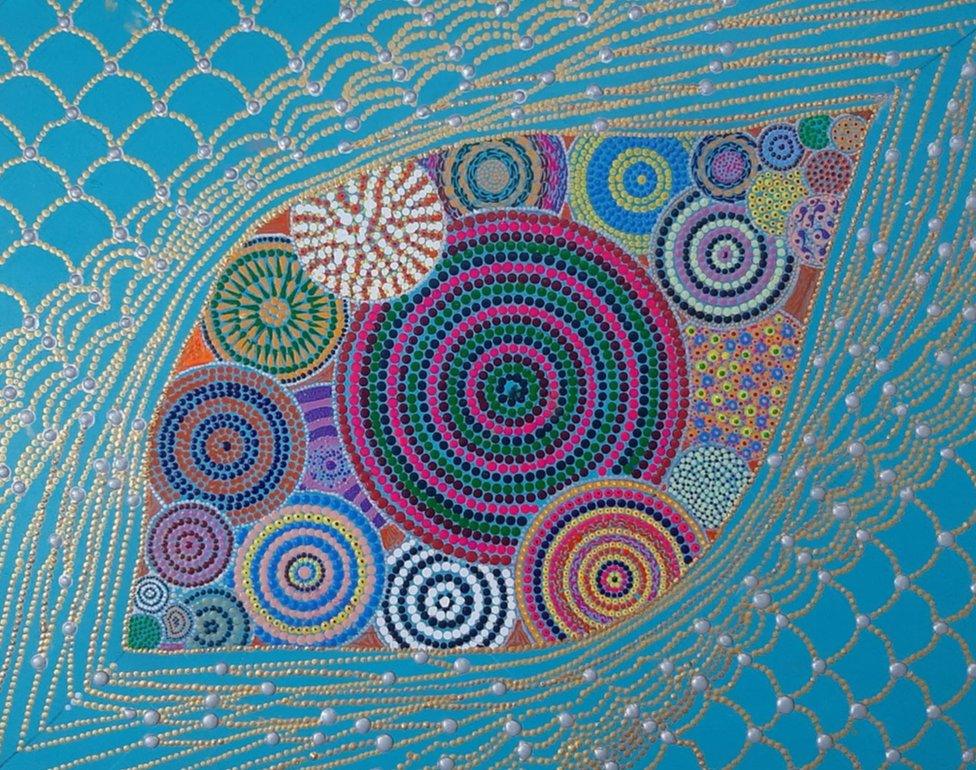
Much of her work uses the Dot Art technique
Shocked at what was happening to her, she started sharing her story on social media, being vocal about how she was feeling, much to the consternation of some who felt she should keep quiet.
"The stigma around mental health here is still so very strong. People would rather you didn't say anything and just suffer in silence," she reflects.
Things got so bad with the condition that she sometimes wondered if it was worth continuing "the journey," as she put it.
But art came to the rescue.
Painting became a life raft, a way to cope with the pain and to find a new outlet for her creativity.
Ogwuegbu came across fluid art by chance on YouTube; and soon after, a dot art group on Facebook that eagerly shared their knowledge with others. Fluid art involves the pouring of liquid colours, usually acrylic, onto canvas, to create free-form images; while dot art requires the careful application of coloured dots from which a pattern begins to emerge.
She painted her first piece and posted it on Twitter in May 2020, and has never looked back.
Art has also brought a new sense of community.
She got enthusiastic feedback on Twitter and made new friends, including a trio in the US who took care of her art supplies by buying and shipping canvases at no cost to her.
And, of course, there was the massive boost from Newton.
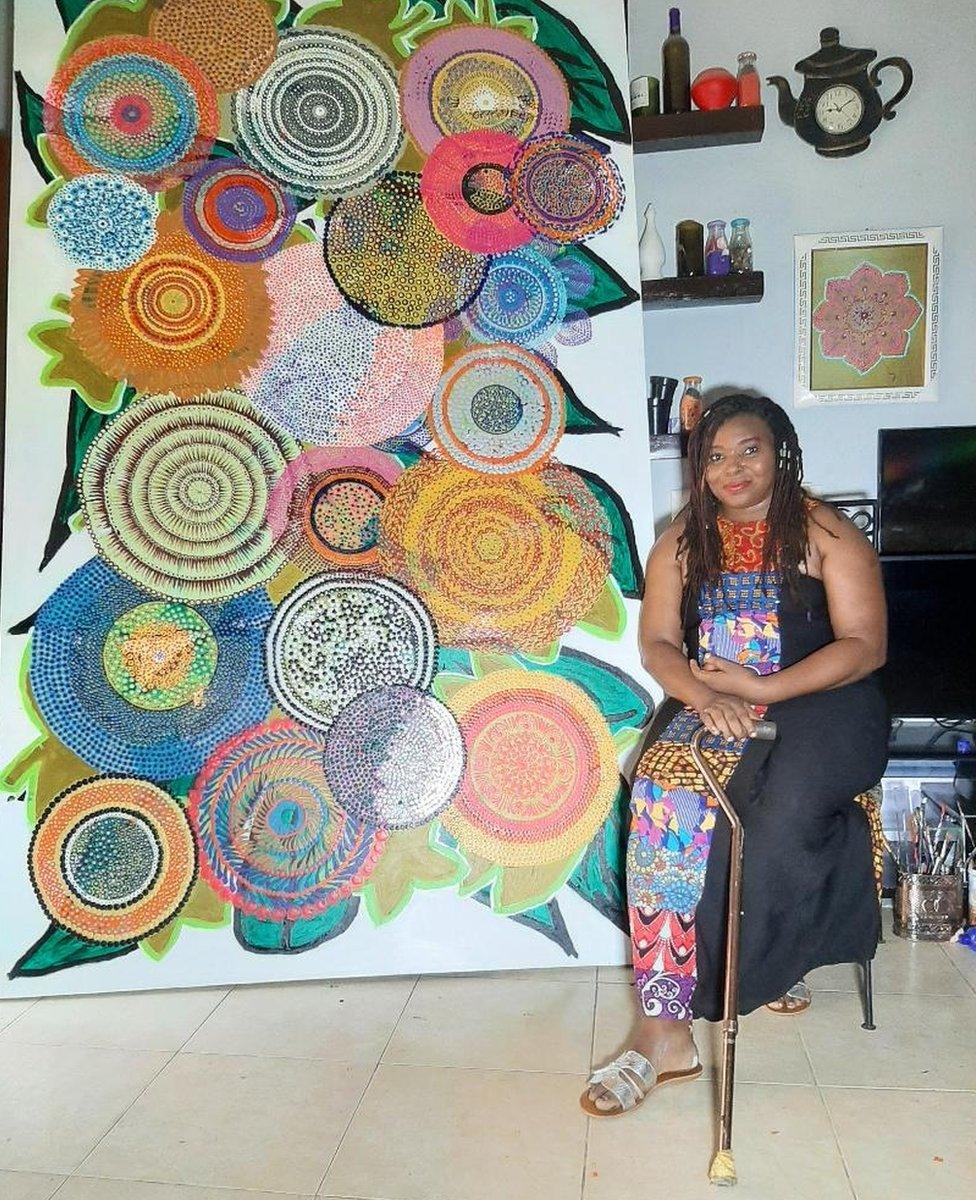
Thandiwe Newton described this painting as "stunning"

Ogwuegbu's pieces are being snapped up internationally, commissions are rolling in, she has had a piece go under the hammer at a charity auction in the UK.
She has also sold some of her works as non-fungible tokens (NFTs), which is a way for people to own the original digital image.
Not bad for someone who had never painted before last year.
She believes art is what saved her and gave her a way forward, allowing her to speak without words.
"I am excited and I can't wait to see where it will go."
Fibromyalgia is a common, little-understood condition that is seven times more likely to affect women than men
Related topics
- Published7 June 2021
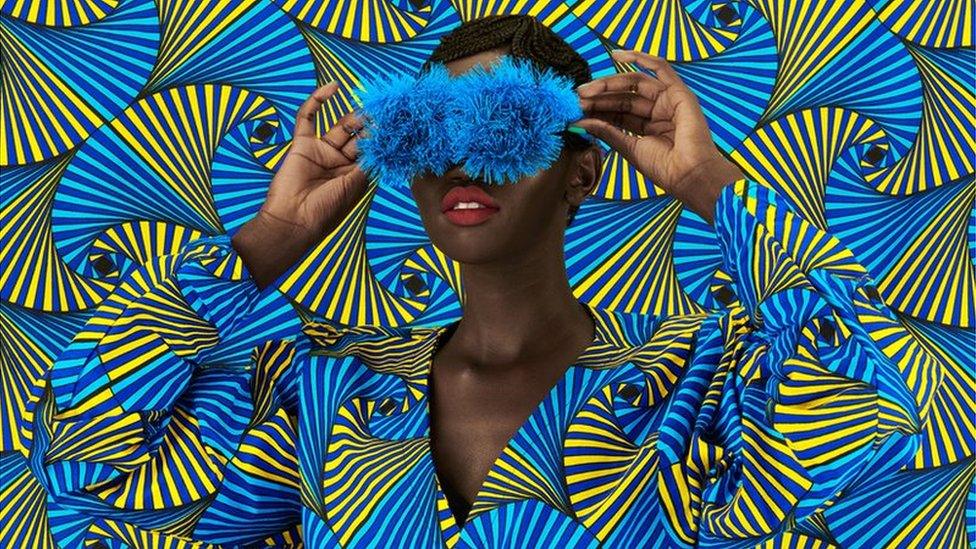
- Published2 December 2020
